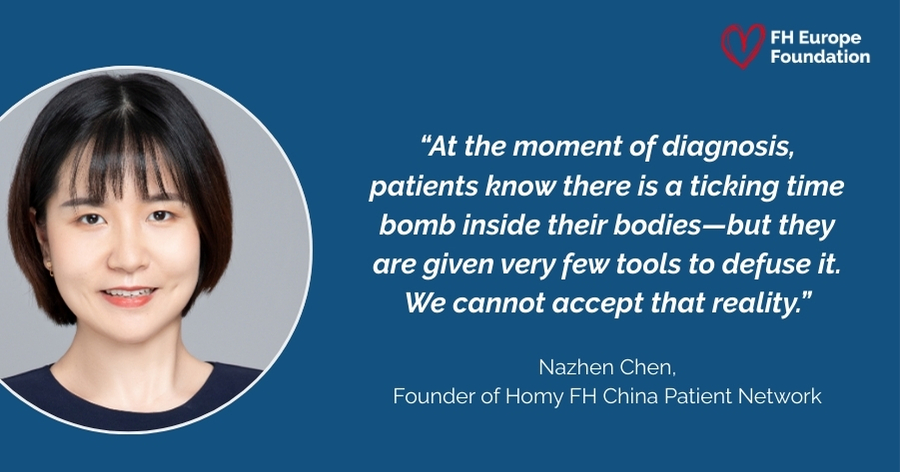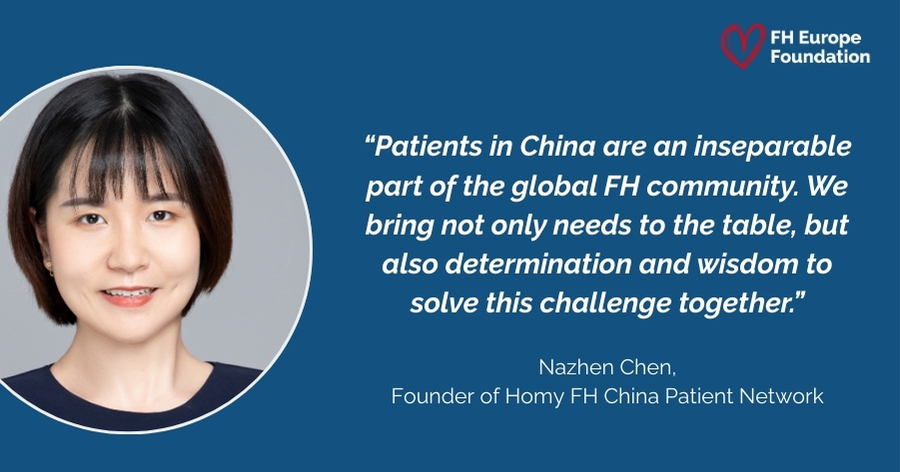Clinical guidelines play a powerful role in shaping how dyslipidaemia is diagnosed and treated. Yet for many patients, caregivers, and advocates, these documents can feel complex or difficult to translate into everyday care.
To bridge this gap, the FH Europe Foundation is launching a three-part webinar series in February 2026 “From Evidence to Everyday Life: Understanding the ESC–EAS Dyslipidaemia Guidelines”.
This free webinar trilogy is designed to empower patients, caregivers, and patient advocates with a clear, accessible understanding of how dyslipidaemia guidelines are developed, what they recommend, and how they can be used to support informed, shared decision-making in clinical care.
Why this webinar trilogy matters
The ESC–EAS Dyslipidaemia Management Guidelines, developed by the European Atherosclerosis Society (EAS) and the European Society of Cardiology (ESC), influence cardiovascular care across Europe and beyond. They help guide decisions on risk assessment, lipid level targets, lifestyle interventions, and medical treatments.
All three sessions will have the same patient-friendly format:
This webinar trilogy is designed for:

📅 12 February 2026 | 6:00 pm CET 👉 Register here
This first webinar explains how European medical guidelines are developed, how evidence is assessed, and how transparency and independence are ensured. It also explores how patients can use guidelines responsibly in real life.
Key topics include:
Speakers

📅 19 February 2026 | 6:00 pm CET 👉 Register here
This session provides a patient-friendly explanation of the 2019 ESC–EAS Dyslipidaemia Guidelines, including their rationale, key recommendations, and challenges in real-world implementation.
Key topics include:
Speakers

📅 26 February 2026 | 6:00 pm CET 👉 Register here
The final webinar explains what has changed in the 2025 focused update of the ESC–EAS Dyslipidaemia Guidelines, why these changes were made, and what they mean for patients now and in the future.
Key topics include:
Speakers
We are pleased to welcome Corazón Sin Fronteras to the FH Europe Foundation Network. Based in Vitoria-Gasteiz, Spain, this long-standing cardiovascular health association joins our growing European community dedicated to improving prevention, care, and patient support in cardiovascular disease.
Founded in 2005 and formally registered in the Basque Country, Corazón Sin Fronteras is a non-profit organisation committed to promoting heart health, preventing cardiovascular disease, and supporting patients and families. Their work spans education, prevention, rehabilitation, and community engagement, with activities ranging from public awareness campaigns and cardiovascular health events to patient support initiatives and collaboration with healthcare professionals.
Joining the FH Europe Foundation Network is a natural step for Corazón Sin Fronteras. With a strong focus on prevention, patient wellbeing, and community empowerment, the organisation recognised the value of connecting with a wider European movement advocating for early detection, equitable care, and improved outcomes in inherited lipid conditions and premature cardiovascular disease.
This partnership is built on a shared commitment to:
Corazón Sin Fronteras brings valuable strengths to the network. Their presence enhances representation from Spain and adds important regional, cultural, and linguistic perspectives. Their long-standing experience in prevention and community-based education complements the network’s work in early detection, patient empowerment, and cardiovascular risk reduction.
Their active involvement in initiatives such as World Heart Day, cardiovascular health weeks, peer support activities, and public outreach aligns closely with the FH Europe Foundation’s commitment to community-led health promotion. These shared efforts will reinforce collective visibility, impact, and advocacy at both national and European levels.
Through membership in the FH Europe Foundation Network, Corazón Sin Fronteras will benefit from:
At the same time, the network is strengthened by:
Together, we continue to build a strong, connected European network committed to reducing the burden of inherited and preventable cardiovascular conditions and improving the lives of patients and families across Europe.
Prepared by
 Elsie (Cindy) Evans,
Elsie (Cindy) Evans,
FH Europe Foundation Ambassador Programme Manager
The FH Europe Foundation is delighted to welcome FH China as new member of our international Network. This partnership marks a significant step in amplifying patient voices, strengthening global collaboration, and accelerating progress for communities affected by familial hypercholesterolaemia (FH) and related conditions.
Founded by Nazhen “Jenna” Chen, a heterozygous FH patient with family members living with the condition, FH China has rapidly grown into a national force for patient advocacy, scientific engagement, and awareness. Key achievements include:
As one of the few patient-centred FH organisations in East Asia actively shaping the national dialogue on genetic lipid conditions, FH China brings unique perspectives, determination, and cultural insight to the global movement.

FH China’s connection with the FH Europe Network began even before formal membership. They participated in the 2024 Annual Network Meeting in Vienna and the 2025 Meeting in Zagreb, where Jenna presented on FH China’s work, challenges, and aspirations. These engagements cemented the alignment between FH China’s mission and FH Europe’s values, emphasising the importance of international collaboration in research, policy, and patient engagement.
Through the Network, FH China aims to:
Their membership brings fresh energy to the Network, enhancing diversity, cultural insight, and research collaboration. With links to clinicians like Dr. Chu, opportunities emerge for joint workshops, knowledge exchange, and bridging global research efforts, particularly in HoFH and emerging Lp(a) therapies. Their work on Mandarin-language awareness tools and localisation of FH Europe resources will make the Network more globally relevant and inclusive.
As part of the FH Europe Foundation, FH China will benefit from shared expertise across more than 30 patient organisations, including high-level policy guidance, participation in international advocacy initiatives, support for communication campaigns, and mentorship from organisations that have successfully influenced national FH policies.
Looking ahead, 2026 promises meaningful collaborations, including:
Together, we are building a global environment where people affected by inherited lipid conditions—no matter where they live—are supported, understood, and able to access the care they deserve.
We are proud to welcome FH China into the FH Europe Foundation Network. Their leadership, passion, and commitment will enrich our international community, and we look forward to many years of collaboration, learning, and impactful advocacy together.

Prepared by
 Elsie (Cindy) Evans,
Elsie (Cindy) Evans,
FH Europe Foundation Ambassador Programme Manager
December marked a milestone moment for FH Europe Foundation, closing an exceptional year of advocacy, collaboration and policy impact with the adoption of the European Safe Hearts Plan. From major EU-level developments to global engagement, patient leadership and research recognition, the month reinforced a shared commitment to prevention, early diagnosis and patient-centred cardiovascular care as the community looks ahead to 2026.
Catch up on the key highlights from the December 2025 edition of the Heart Beat newsletter: